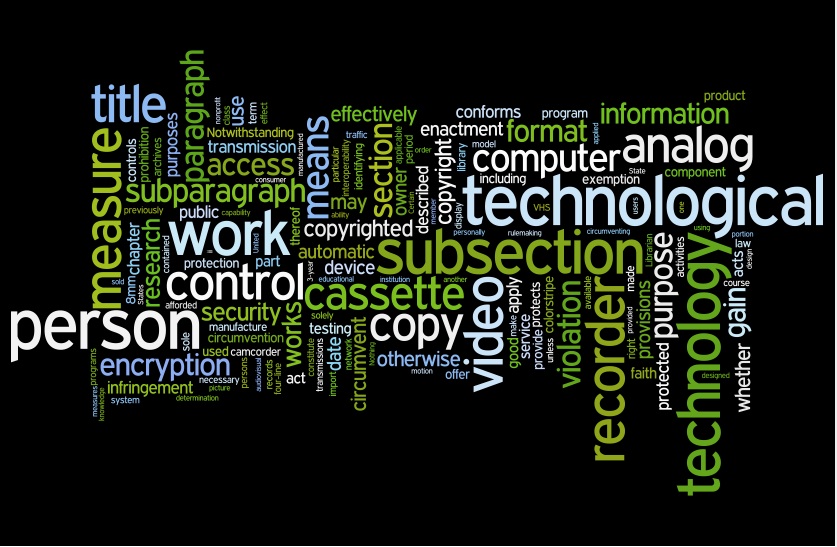Clinton-Era Digital Copyright Law Needs Overhaul, Argues Rights Group
SAN FRANCISCO, May 13, 2010 — A 12-year-record of abuses and misuses of a law designed to prevent digital piracy shows definitively that it isn’t working as intended, said a digital rights group in a new report released Thursday. [https://broadbandbreakfast.com/wp-content/uploads/2010/05/DMCA.jpg]h

SAN FRANCISCO, May 13, 2010 — A 12-year-record of abuses and misuses of a law designed to prevent digital piracy shows definitively that it isn’t working as intended, said a digital rights group in a new report released Thursday.
“In the years since the DMCA’s passage, section 1201’s harmful effects on copyright’s core goal to “promot[e] Progress” have become unfortunately clear,” write Pan C. Lee, Daniel S. Park, Allen W. Wang and Jennifer M. Urban, a group of legal researchers at Berkeley Law School. “It is in need of an update to restore the balance.”
“I think we’ve seen more and more examples of the [Digital Millennium Copyright Act] being used more broadly than was probably intended,” said Sherwin Siy, Public Knowledge’s deputy legal director. “I think it happens a little too often, a little too easily.”
The Washington, D.C. public interest group wants lawmakers to recalibrate a controversial section of the digital copyright law back to a legal standard established by a landmark 1984 Supreme Court ruling. The Sony v. Universal ruling established that manufacturers of devices that are capable of substantial non-infringing uses could not be held liable for copyright infringement.
Lawmakers should update the DMCA to allow for non-infringing uses of copyrighted content, recommend the report’s authors. Currently, it doesn’t distinguish between legal and illegal purposes of circumvention.
These changes wouldn’t undermine the law’s goal of preventing digital piracy because people who break the locks, and who make tools to break the locks with the intent to pirate content would still be liable, they argue. A decision finding file-sharing company LimeWire liable for massive levels of copyright infringement because of its past marketing tactics and its knowledge of the activities of its users buttresses this argument, notes Public Knowledge’s Siy.
Lawyers for the entertainment industry trade-groups have argued that the DMCA is working as intended, but public interest groups such Public Knowledge and the Electronic Frontier Foundation, as well as many academics, say that it skews the balance of the law too much in favor of rights-holders. That comes at the expense of other innovators, researchers, educational institutions and consumers who want to manipulate or manage their media for personal uses.
The DMCA criminalizes the act of picking the locks on digital content, as well as the distribution of tools to break those locks. Violators face a jail term of up to five years or fines up to $500,00.
One of the most dramatic incidences involving the law concerned a Russian programmer who the FBI arrested in Las Vegas in 2001. He was charged with distributing a software program that could unlock the copy-protection scheme on electronic books.
People can petition the copyright office for exemptions when it holds its triennial review, but the Berkeley Law School authors of the Public Knowledge report say that this process doesn’t go far enough to right the imbalance.
Since the law’s enactment, the Copyright Office has granted a few exemptions. College professors are allowed to access and clip DVD content for classroom use. Blind people can break through the locks so that they can hear books read aloud. Security researchers now won’t be hunted down by the FBI for breaking through the locks on CDs for research purposes. Nevertheless, both Public Knowledge, the EFF and others argue that the law still goes too far.
The EFF has compiled a list of incidences that highlight the law’s shortcomings. In 2009 for example, Apple used the DMCA to try to shut down a discussion on BluWiki about reverse-engineering the iPOD to allow software other than iTunes to play music. And some security researchers are still hamstrung by the law. In 2009, for example, Alex Halderman, a University of Michigan professor, had to petition the Copyright Office for an exemption for his research about the security system for the popular Electronic Arts game Spore.
The examples are just two of dozens of incidences over the years of companies using the law in contexts other than piracy. Some companies have unsuccessfully tried to use it to block competitors from making compatible products.
“It gets fought out in court, and eventually the right side prevails, but in the meantime, they get injunctions against the use of their devices, and that can cause massive amounts of harm,” says Siy.








Member discussion